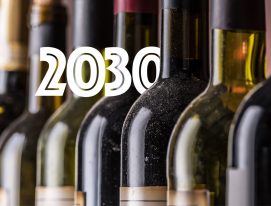The growth of organic wine is occurring across the globe in every category: from 1.5% of the market in 2013, it rose to 2.6% in 2018 and is expected to reach 3.5% by 2023.
To meet this demand, Argentina has increased and diversified its output of organic wines: more and more wineries, large and small producers alike, are getting their vineyards and labels certified.
The increasing popularity of organic wines is driven by different factors many of which aren’t strictly related to the world of wine: “People are trying to eat more healthily, they want to know exactly what it is they’re eating and drinking and organic products, wine especially, offer reassurance in that regard. Also, organic wine is better for the environment and reflects more clearly the grape and place where it came from,” says Mauricio Castro, coordinator of Vinodinámicos, a group of organic wine producers in Argentina.
Ignacio Martínez Landa, Director of Marketing and Communications at Domaine Bousquet, agrees: “A lot of consumers have been seeking out organic products for quite some time. It began with food and has been moving on from category to category. Wine has been a part of that trend. Consumers want their products to be traceable because they believe that one made organically is very often better for them than conventional products.”
But what is organic wine? It is wine made from grapes grown in vineyards that don’t use chemical products (fertilizers, herbicides, pesticides) and that thanks to rational management of natural resources maintain or increase the fertility of the soil and biological diversity. Adherence to these precepts is certified in Argentina by four different bodies: Argencert, Letis, OIA and Food Safety, which ensure the traceability of all the processes involved in wine production.
The most recent statistics show that 161 Argentine vineyards have been certified as organic – making up a total of 6240 hectares – while 53 wineries make organically certified wine. Although Argentine consumers are embracing organic wine, the vast majority is exported. 75% of organic wines produced in Argentina are consumed in Europe while other important markets are the USA (4%) and Japan (3%).

A leap in the quality of organic wines
“Organic wines are very well positioned because of the increasing popularity of the movement in general. This has had a knock-on effect on its market presence. Wineries have thus been working hard to improve the quality of the wine that is available and these efforts have been very successful,” says Matías Ciciani Soler, oenologist at Escorihuela Gascón.
The leap in quality is one of the stand-out recent phenomena among organic wines. “It is no longer the case that organic wines are assumed to be poor quality. People are beginning to see that the perception of organic wine that was prevalent a few years ago: that it was focused more on protecting the environment than on producing quality wine, no longer applies. Now the emphasis is on making good wine, the fact that it’s organic is simply an added bonus,” says Facundo Bonamaizón, agricultural engineer at the Chakana winery.
In parallel to the improvement in quality, Argentine organic wine is also growing more diverse although Malbec still leads with the way with labels such as Escorihuela Gascón Organic Vineyard Malbec, Saint Felicien Malbec Orgánico, Famiglia Bianchi Malbec Orgánico, El Burro Santa Julia and BenMarco Sin Límites Malbec Orgánico, all of which are very accomplished wines. Beyond Malbec, Lagarde Organic Rosé, Animal Chardonnay Orgánico, Alpamanta Estate Cabernet Franc, Doña Silvina Torrontés and even the sparkling Domaine Bousquet Brut are all high-quality, very enjoyable wines.



